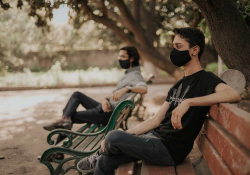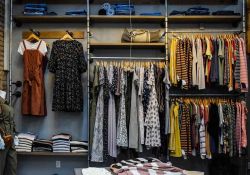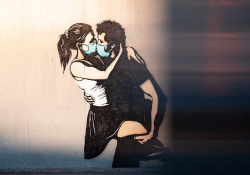The Italian Quarantine
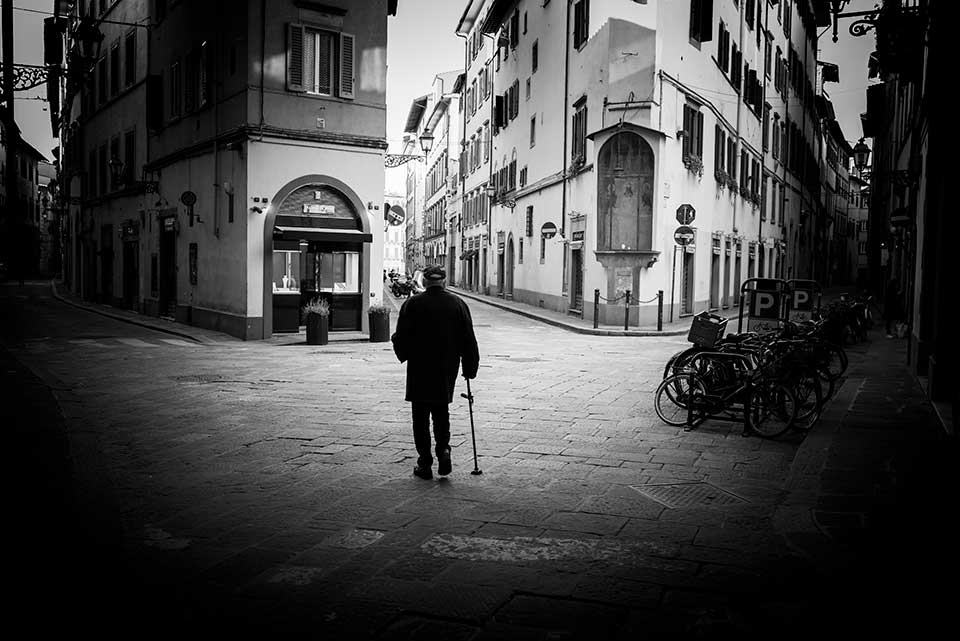
A novelist living in quarantine in Florence looks back at Italy’s cultural history and then forward, considering whether something positive might rise from the ruins that the virus will leave in its wake.
Last week I ventured out of my flat in Florence, armed with my auto-certificazione, the document you must possess in order to justify leaving your residence at any time in locked down Italy. As I cycled, trying to snatch a few minutes of permitted daily exercise, I veered for the Piazza del Duomo. I glanced around nervously, on the lookout for any abnormalities, policemen, anxious to avoid any official entanglements or questions. My exodus was marked by the electric flutter of adrenaline. As I gingerly reached the geometrically intricate miracle of Brunelleschi’s dome, I realized that I shared the square only with a military vehicle and some soldiers; no other civilian could be seen. It was disquieting. Did I mention the silence? It was cosmically still, as if I had just alighted on an alien planet that housed a carbon copy of Florence, but utterly bereft of sound and people. Just now the real Florentine sun is starting to ripen and ferment, settling into its springtime incarnation, and as it touched the upper levels of the Santa Maria del Fiore Cathedral and the gargantuan dome that sits atop it, a dazzling, magical clarity resulted. But there was no one to share the moment with. I was alone.
Solitude. This is the inalienable fact of the Italian lockdown. We are all alone suddenly. Ordinary men and women alone in their homes, critically ill patients alone in hospitals (for those who are battling the Covid-19 virus are strictly isolated because of the risk of infection; not even relatives or parents are allowed to remain with them), and those shoppers who must remain at a meter’s distance from one another when they go out for essentials like food and medicine. The only places that remain open in Italy are pharmacies, supermarkets, bakeries, tobacconists, and newspaper kiosks. One of the cruelest privations in terms of everyday social interaction for the Italians—and for me, for that matter—is the loss of the ritual of the espresso, taken at the bar. The very few souls one sees outside are more often than not masked, wary, jittery. I was chastised by one man for walking too close to someone else the other day on a street that was otherwise deserted, like every other street in Florence. At a bakery, a member of staff insisted that I step back from the counter. When I did as she asked she insisted I step back further. To have stepped back any further would have required the demolition of the wall.
For Italians, who are so gregarious, so physically demonstrative, so loquacious, able to throw a party anywhere, even on a street corner, it is a cruel, surreal plight that they suddenly find themselves in. And the city’s ethereal beauty now feels almost sterile without the complementary babble of human emotions and voices that it ordinarily generates. Florence has become like a colossal movie set, after having been abandoned when the production money didn’t come through, an open-air theater for no one. While it is true that its almost metaphysical beauty and purity can now perhaps be apprehended the more clearly, the absence of humanity is elegiac. Perhaps we realize that beauty is inevitably diminished when it is glimpsed in isolation from others.
Florence has become like a colossal movie set, after having been abandoned when the production money didn’t come through, an open-air theater for no one.
It is difficult now to imagine that only two weeks ago the city was so different, filled with tourists, all galleries and cinemas and bars and restaurants open, sounds of traffic, street life, singing filling the air. But it’s not just Florence, it’s the whole of Italy. At first it was only the northern region of Lombardy that was placed under quarantine, and in Tuscany we felt some pangs of guilt about that region’s restricted life. Then on March 9 the prime minster, Giuseppe Conte, ordered that the whole of Italy be placed under a lockdown after thousands of Italians fled from the north to Puglia and Calabria. They wanted to reunite with their families, stirred to panic-filled action after there was a leak about the projected quarantine in Lombardy from the League, the opposition party. Conte’s decision was the only real option available to him, for people had now grasped that the most serious thing about the coronavirus is its terrifying level of contagiousness. The next day, Conte ordered the lockdown to go into a higher gear—restaurants and bars that were allowed to stay open until 6pm the previous day were now ordered to shutter completely. Tourists were ordered to leave, hotels and Airbnb’s emptied instantly.
By then the Italian government had already been accused of having messed up, shutting the door after the horse had bolted. It is true that a national alarm had been sounded in January when the virus was first detected to have traveled from Wuhan to Italy. Perhaps a quarantine could have been instigated earlier. In his defense, Conte has displayed exemplary transparency in terms of the communication of his intentions, not electing to disappear whenever the going got too tough. He has proved to be more of an old-fashioned statesman than his counterparts in Europe and America: the UK, for example, is a hothouse of rumors and ambiguity, as Downing Street invites selective journalists to relay its incoherent messages. Similarly, the Italian medical sector—one of the finest in the world, and free to all—has been admirably professional and composed, despite the staggeringly difficult circumstances in which it is now having to function. Bergamo’s deaths are happening now so quickly that the cemeteries and crematoria simply can’t keep up, and the military has been called in to intervene and help.
The post office always used to be a bit of a gossip center where people stopped and chatted, and business was conducted at a leisurely pace.
On the whole, by all accounts, the Italians’ sense of civic duty has been good. Italians were never a populace fueled by a strong sense of social awareness; they were noted for their defiance, their contempt for authority and rules, but now they seem to be united by a common respect for one another and a gentle persistence and determination to do the right thing, to be considerate of others. I went to my local post office a few days ago, which is still functional but now ruled by a new protocol: one must wait outside in an orderly fashion, observing the one-meter social-distancing rule, and then only go inside when another customer comes out. The post office always used to be a bit of a gossip center where people stopped and chatted, and business was conducted at a leisurely pace: now everything has become Calvinistic and severe. But it’s an admirable method; to be overtly emotional now would be disastrous.
Similarly, the staff at supermarkets, the pharmacists, the medical personnel that I have spoken to: they all give off an air of stoicism and resilience. When I took the time to sincerely thank one of the exhausted supermarket staff for his unfailing efforts to meet the needs of his customers, he just brushed off my gratitude modestly. And no one has been panic-buying, at least not in Florence: once Italians were reassured that the supply of food would be constant, they could relax. I spoke to a freelancer in film production based in Rome, and he told me that the Romans have been obeying the rules and keeping their distance. He didn’t think that there was a risk of eventual anarchy breaking out, since Italians are serene by nature, unlike the more volatile Anglo-Saxons. Others I spoke to, such as a language teacher and translator, based in Lucca, found herself missing terribly the screams of her students, camaraderie with colleagues, and the colorful mess of school life.
An interesting quasi-paradox about pre-lockdown Italy is that while bureaucracy was always labyrinthine, glacial, and elaborate—when paying in cash to an Italian bank account, for example, you had to produce your medical card with your tax code and your identity card—everyday life was structured around the concept of improvisation and the idea of making it up as you go along. Now, in lockdown, Italy improvisation’s spark has been snuffed out. But a sense of social responsibility has hesitantly slipped into the space improvisation once occupied.
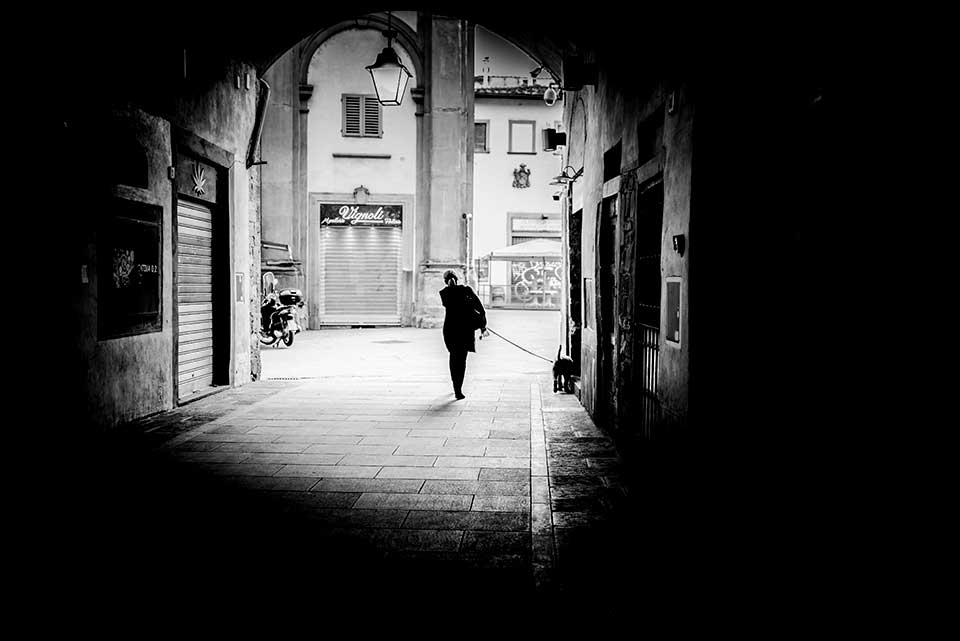
Another kind of apprehension or fear sometimes comes spasmodically into focus. It is a fear about society’s fabric falling apart: a sense that, as Yeats puts it, the center cannot hold.
And yet Italians are extremely resilient people; they are fighters and are famously inventive. Italian painting and literature is glorious. Italy gave the world—arguably—its single greatest feat of architecture (Brunelleschi’s dome), a cosmically equilibrated vision of the afterlife (Dante’s Commedia), exquisite opera (Puccini, Verdi, Rossini), lofty novelists (Lampedusa, Pavese, Calvino), ahead-of-their-time intellectuals (Pasolini), genius filmmakers (Fellini, Visconti), and modernist creators of conundrums (Pirandello). They discovered that the earth was not at the center of the universe (Galileo). They created art so grand that it rivals the splendors of nature (Michelangelo). Contemporary doctors and dentists are among the finest in the world; today Carlo Rovelli is one of the world’s most preeminent physicists. Their artisans and electricians, their plumbers and engineers, their architects and chefs are creative in a way that is instinctive: Italians locate problems and devise solutions to them. They are resilient, and they have history’s wisdom and survival code stamped into their DNA, so I sometimes allow myself to feel tentatively optimistic about Italy’s future and its contortionistic ability to prevail and surmount obstacles and rise above them. Boccaccio’s The Decameron, an absurdly fertile feat of perpetual storytelling, was the product of defiance—defying the plague by telling stories that took place within or outside its orbit. Manzoni’s The Betrothed is another celebrated work that touches on the idea of contagion and disease, evoking Milan’s plague of 1630.
Beyond the obvious claustrophobic nature of the quarantine and its curtailment of social contact, another kind of apprehension or fear sometimes comes spasmodically into focus. It is a fear about society’s fabric falling apart: a sense that, as Yeats puts it, the center cannot hold. It must also be this fear that is uppermost in the minds of people who do not live in the exquisite countryside of Tuscany or close by Florence’s centro storico’s ethereal grace. In Florence’s drab suburbs—Scandicci, Sesto Fiorentino, Campi Bisenzio—a lot of buildings that were constructed in the 1970s resemble dour Soviet tower blocks; the flats inside are often terribly cramped and have no balconies and only run to about fifty square meters. In such suffocating conditions, people’s nerves must be close to frayed. On March 10 the government unveiled a plan for deferred utility bills, wage subsidies, and suspended mortgage repayments for people during the quarantine. These subsidies have yet to materialize, however. Ironically, Italy has received more aid from China than from the EU, despite the latter’s publicly trumpeted promises to do what it takes to keep the country afloat. And on March 22 a medical team of doctors and nurses from Cuba was flown in to help the magnificent Italian nurses and doctors. It seems that Italy’s more immediate neighbors are less concerned about its plight than those from farther climes.
Maybe in some ways Florence has reverted to a kind of medieval severity, has slipped back into a version of what it might have actually once been, stripped as it now is of pleasure and tourism, commerce and lightness. It was here that the rediscovery of Greek texts led to the birth of a new humanism, which in turn ushered in the Renaissance, as facilitated by the wealth and patronage of the Medici family, and the Middle Ages came to an end. In some ways maybe the universal privation of the lockdown might serve to remind us that the little things count, that life shouldn’t always be about immediate gratification, a perpetual searching for pleasure and purchases. At the risk of sounding preachy, could our collective enforced monasticism offer people a chance to recalibrate, to become less shallow and image-obsessed as we seem to be, or at least as shallow as the cell phone culture at large seems to promote and encourage?
Some people I have spoken to—friends and colleagues on both sides of the Atlantic—feel that the Coronavirus pandemic may trigger some kind of existential and ethical change for the better. It is certainly true that it has forced us all to slow down, to spend time alone, to take stock and evaluate our lives, ourselves, our values, not just in Italy but, more and more, increasingly, all over the world. Those who are more naturally disposed toward meditation, introspection, spending time in their own company may be faring better than those who need to be constantly on the go, whose lives are caffeine whirls and frenetic power days. But maybe we should seize upon this pause button willingly, wake up, and connect with reality again on a more essential level. Could that pause button lead to a reboot? One hopes.
Clearly, things were and are getting out of hand on all levels—environmentally, politically, ethically. The fact that nature has already demonstrated spectacular powers of reinvention and auto-healing (I am thinking of the recent purified satellite images of Wuhan and Italy) is something that should leave us faintly awestruck, humbled, grateful. Last night I saw the stars in the night sky from my flat for the first time in my fifteen-odd years of living here. The canal waters of Venice are now transparent, and swans and dolphins have been sighted in the ports of Trieste and Cagliari after this period of radically decreased travel, economic activity, and human emissions. Is the planet trying to tell us something? Is this a chance to reclaim our humanity? It’s tempting to feel that something positive might rise from the ruins that the virus will leave in its wake.
Is the planet trying to tell us something? Is this a chance to reclaim our humanity?
I don’t wish to understate the enormity of the human tragedy that the virus has precipitated and the economic and social devastation it will wreak in society at large. And yet perhaps we can take solace in the fact that the planet has now, by an unforeseen and complex twist of fate—the gradual locking down of the world—been given a temporary reprieve from the toxicity we have been feeding it for time immemorial. Maybe that thought could help provide the light which sustains us in the darkness to come. In the meantime, Italy’s own flame remains diminished but not extinguished.
Florence

